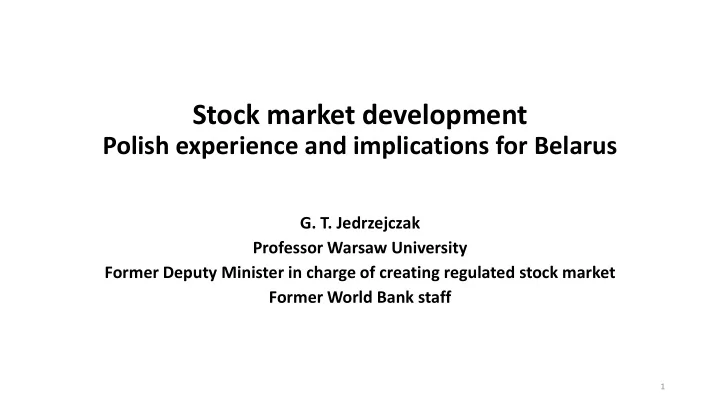

Stock market development Polish experience and implications for Belarus G. T. Jedrzejczak Professor Warsaw University Former Deputy Minister in charge of creating regulated stock market Former World Bank staff 1
Stock market development: Polish experience and implications for Belarus The simplest and the most consequential question: why do you need a stock market? Poland: privatization by IPOs, with a broad public ownership of stock by both, unsophisticated and sophisticated investors Wrong answer: focusing on the stock exchange as a symbol of market economy, rather than a level playing field for issuers and investors, efficient and safe back-office for trade, and effective regulation. 2
Stock market development: Polish experience and implications for Belarus Five questions to follow: • Question 1. How much market consolidation? • Question 2. How safe transactions and payment? • Question 3. What is sufficient information? • Question 4. What is effective supervision? • Question 5. What corporate governance of the market? 3
Stock market development: Polish experience and implications for Belarus In Poland, the answer to these five questions resulted in: • Single stock exchange - Warsaw Stock Exchange created and owned by the state • The Central Depository responsible for the management and supervision of the depository-settlement-payment system; licensed brokers and brokerage houses • Formal prospectus • Licensed advisors • State Securities and Exchange Commission 4
Stock market development: Polish experience and implications for Belarus • How it works after 25 years: • Poland used very well the advantage of “lagging behind” and avoided creating many traditional institutions of mature markets • Polish stock market still has strong technological and governance fundamentals • The trust of investors regarding transparency of the market and safety of transactions is not questioned 5
Stock market development: Polish experience and implications for Belarus How it works after 25 years (cont): • In response to ICT changes and resulting cross-border trade, response of institutions responsible for the Polish capital market has been not sufficient. • Privatization of the WSE in 2010 has not reached results expected to achieve. There is no strategic investor who would include WSE into a recognized subnet of the global market. Continued control by the State Treasury sent a wrong signal to investors. • Consolidation in 2006 of the supervision of the whole financial sector followed international trends but created less focused and politically weaker institution 6
Stock market development: Polish experience and implications for Belarus How it works after 25 years (cont): • Extending and diversifying of the supply of stock beyond privatization was not sufficient. Market created for new firms, NewConnect, after promising start in 2007, stagnated after few years, both in a number of firms and trade volumes • Marginalization of Open Pension Funds, major institutional investors, had negative effect on demand for stock 7
Recommend
More recommend